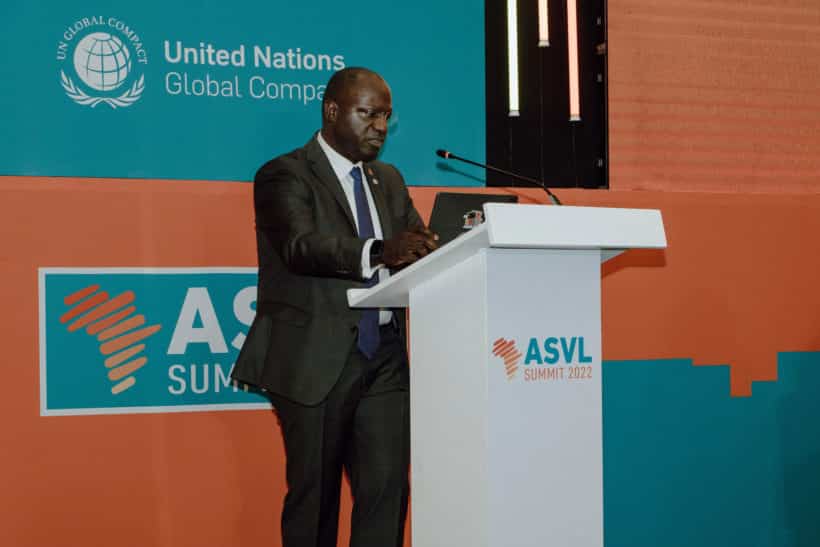
Over the next decade, 70 per cent of the new value creation in the economy will come from digitally enabled business models. Digitally and financially literate individuals will be a community’s passport to the digital economy, and we must meet people where they are through innovative ideas.
Digital skills are the range of abilities enabling people to create, to share content, to communicate, to collaborate and to solve problems effectively by leveraging technology. For an individual, financial skills are the essentials of personal financial management whereas for an entrepreneur they are more focused the management of financial resources needed to build a sustainable business. It is the combination of skills and the collective ability to withstand and to adapt to local and global shocks that are at stake.
Access to digital financial technologies opens pathways to earn, to save, to invest, and to borrow. And in some instances, these technologies can be instrumental for health or humanitarian emergency support like Novissi, in Togo, which accelerated digital cash transfers to communities. The program provided communities with social grants leveraging mobile phones and mobile money technology thus reaching communities where they were to cope with the impact of the COVID-19 pandemic. While we cannot always solve for health and climate-related emergencies, we can partner to uplift communities with the right skills and tools to thrive in the digital economy.
We know that between 2010 and 2019, 300 million Africans were brought online for the first time. Improving access is a necessary step but not sufficient to transform ideas into opportunities. While this bodes well for providers of digital financial products and services, there is a skills and training gap that must be addressed in new ways.
Developing skills through gaming
In bridging the divide, a study released in September 2022, 62 per cent of respondents cited a lack of digital skills as the primary barrier to creating and enhancing livelihoods through the digital economy. Practical Business Skills (PBS) is, an online learning platform, designed to accelerate the development of youth and merchant skills. For instance, Trace Academia, reimagined Visa’s PBS into an interactive course covering different skills, thus meeting young people online to provide a learning experience on their mobile devices. Moreover, eCommerce platforms such as takealot and Anka which support merchants, are important pathways to increase opportunities for skills development. For example, Daraz, in Pakistan leveraged PBS’ to enhance Daraz University offering to merchants in Urdu. By making the content accessible in local language, we ensured that language would not be a barrier to access content.
As we think about skills development at scale, video game players present an interesting opportunity. The gaming community in sub-Saharan Africa grew from 77 million to 186 million between 2015 and 2021. Visa, where I work, is collaborating with Paradise Game to deliver online financial education to a growing African community. Paradise Game will give their online gaming community access to digital financial skills to help them rethink short and long-term financial goals as well as practical money skills. Connecting their passion for gaming with financial education is one of the objectives of this nascent collaboration. Paradise Game will disseminate Financial Football to gamers making skills development a critical engagement tool at the intersection of sports and education. By gamifying learning and entering their world we have an opportunity to reinforce engagement and motivation as well as social connectivity.
Moreover, Newzoo, the world’s leading provider of games and esports data and insight, estimates that 33 per cent of the 186 million (63 million) pay for games as the continent embraces digital currencies. Across South Africa, Nigeria, Ghana, Kenya and Ethiopia, gamers spent more than USD 500 million in 2021. As the required skills and tools are brought to individuals and communities, it is important for the right partners to deliver tailor made programs where communities are.
By bringing core competencies, meaningful partnerships are created
Visa’s collaboration with Shared Value Africa and United States Development Assistant Fund aims at improving communities’ ability to better utilize the grants they receive through skills development. The solution developed uses platforms such as WhatsApp to make learning accessible with limited internet connectivity and designing for offline capabilities too.
Accelerate program is another initiative that will help 6,000 women-led micro, small and medium-sized enterprises (MSMEs) in rural and remote communities gain practical skills to sustain and grow their business.
We are also collaborating with the Mauritanian Investment Promotion Agency (Agence de Promotion des Investissements en Mauritanie or APIM) to upskill self-employed youth and micro-businesses that make up the vast majority of jobs among the entrepreneurial households in Mauritania. The objective of this partnership is to break unfavorable intergenerational cycles of being underserved by the financial system and chart a path towards prosperity for more youth and more women where they are. In Africa and in Asia, these partnerships demonstrate a pathway to scaling digital financial literacy programs. But there is no one-size-fits-all solution and at different levels, community networks are critical for us to adapt solutions to local contexts. Trust is the glue that brings us together for the impact we seek to achieve through individuals and households. Peers or neighbours often serve as the most trusted sources of information on digital financial technologies, thus underscoring the importance of grassroot social networks in designing interventions. The latter will bring individuals, communities, and businesses the digital and financial skills they need to withstand and adapt to local and global challenges.

